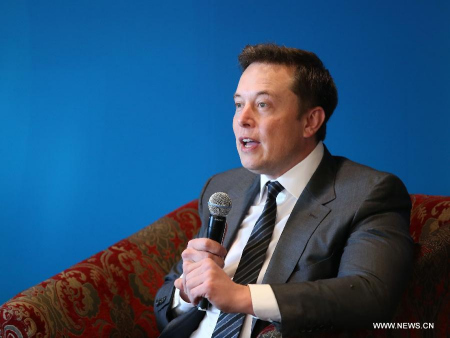
CEO of Tesla Motors Elon Musk speaks at the breakfast meeting with the theme of "Dialogue: Technology & Innovation for a Sustainable Future" during the 2015 Boao Forum for Asia (BFA) in Boao, south China's Hainan Province, March 29, 2015. (Xinhua/Pang Xinglei)
Elon Musk, the U.S.-based entrepreneur, has said the next decade would see a "dramatic increase" in artificial intelligence (AI), most forms of cancer cured and, possibly, the first human mission to Mars.
Musk, CEO of private rocket firm SpaceX and electric car producer Tesla Motors, hopes the next ten years will also see more electric vehicles on the road, and a surge in the production and consumption of sustainable energy, he told Xinhua.[Special coverage]
An advocate of space exploration and electric transportation, Musk has attained recognition for his unprecedented achievements in both industries.
SpaceX was the first private company to successfully send a spacecraft to the International Space Station and has contracts with U.S. space agency NASA, while Tesla Motors produces electric vehicles that boast the performance of sports cars.
PRIVATE MANNED SPACE FLIGHT
Musk explained that SpaceX aims to send its first manned craft into space in the next two years, adding that this year would see "a lot of interesting tests" with Version 2 of the Dragon spacecraft, which would help it with the precision of a helicopter.
Technology, he said, is important to extend life beyond Earth to avoid extinction. He predicted a human mission to Mars could be as early as 2025.
"My guess is that [it will probably take] 10 years to send the first manned mission," he said.
SpaceX is close to achieving a precise soft landing with rocket boosters, he said. If successful, this would be a significant step toward making rockets reusable, thus, reducing the cost of space travel and making settlement on Mars more attainable.
Currently, rockets are just detached and allowed to fall back to Earth. A reusable rocket system could slash the cost of space transportation by a factor of 100.
The company's Falcon 9 rocket landed on a floating ocean platform earlier this year but the rocket landed hard and exploded.
However, a number of separate short takeoff-and-landing tests have been successful, according to Musk.
"We just need to fit the pieces of the puzzle together [...] I'm hopeful that we'll achieve that later this year." he said.
















































